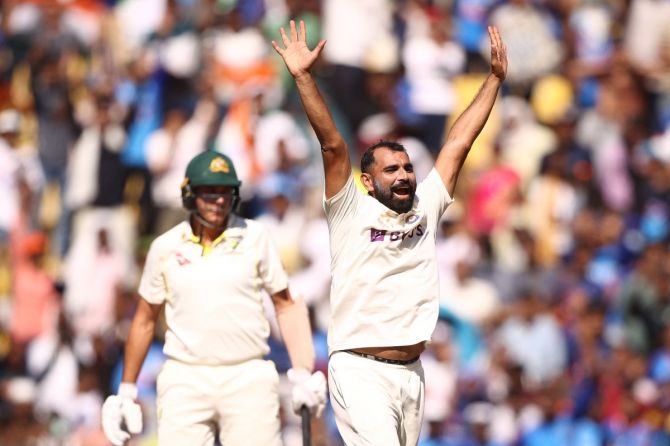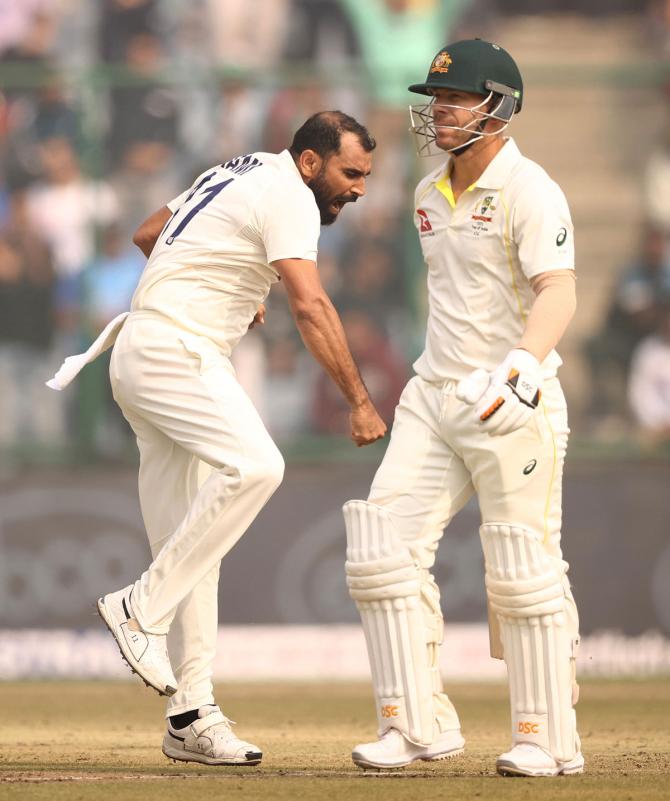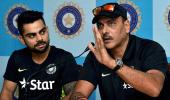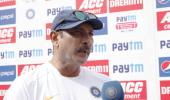'I don't think Shami had any doubts that Ravi would stick by his word, but to see the head coach move heaven and earth to ensure his best interests were taken care of at a difficult time must have made a massive impact on him.'
A fascinating excerpt from R Sridhar's must-read book Coaching Beyond: My Days with the Indian Cricket Team.

We were in South Africa in early 2018, for the first Test in Cape Town. Within half an hour of the start of the game, Bhuvi reduced them to 12 for three. Then we bowled like millionaires, and they ended up making 286.
That evening, Ravi summoned the pace attack (Bhuvi, Shami, Bumrah and Hardik) and thundered, 'What's this rubbish? I have seen so much driving in the middle that I am sick of it. From this point on, whatever driving happens must be only on the road. No bloody half-volleys, get stuck into them.'
We lost Cape Town. We couldn't chase down 208 which was ridiculous. Then we lost Centurion, another match we should have won and where we could have been 2-0 up or at worst 1-1. We had already surrendered the series when we went to Johannesburg for the final Test.
We did the unthinkable by choosing to bat because we felt the conditions would only get worse for batting as the game wore on. Shami didn't turn up for the first innings -- he went one for 46 from 12 overs, and then on the fourth day, he was again reasonably inconspicuous till tea, by which time South Africa appeared on course for victory.
Needing 241, they had reached 136 for three when the lads trooped in for tea break.
Shami looked disinterested as he came back in, like he did at lunch, when he had piled up his plate with rice and mutton curry.
During the first interval, Ravi had lost his shirt after one glance at Shami's plate. 'Bloody hell, will you satiate your hunger here itself or will you save some of it for wickets, too?' he shouted.
In his typically laconic, laid-back fashion, Shami drawled, 'Haan, haan, yahan bhi kha lunga, udhar bhi kha lunga (Yes, yes, I will eat here and I will eat there, too).'
We all shared Ravi's frustrations because this was a series that ought to have played out differently. It looked as though for all our toils, we would have nothing to show.
Just before Shami left the dressing room to return for the post-tea session, Ravi took him aside and wound him up. Not by telling him he was a match-winner and stuff like that, but by reminding him of the lunch-time conversation and Shami's promise.

Post-tea, he was unplayable. He blasted through the middle and lower order to finish with five for 28, and we ended up winning by a comfortable 63 run margin.
As he sauntered back into the changing room, he grinned wickedly, 'Haan, mere ko aur gussa dilao aap log. Mere ko gaali do. Utna gussa nahi dilate jitna dilaana chahiye (Yes, please make me more angry. You people should curse me. You don't make me as angry as you should).'
If Shami took the 'curses' in his stride, it was because of the rapport he enjoyed with Ravi. When he was going through domestic turmoil, with his wife slapping a case and everything being played out in the media, the first person Shami called was Ravi, during the Nidahas Trophy in Sri Lanka in 2018.
He told Ravi, 'Yeh maine kuch nahi kiya (I didn't do any of these things).' He wanted to have Ravi's faith because he knew this could affect his career.
Ravi immediately called up his people in Mumbai, who in turn fixed things up for Shami in Kolkata for him to take things forward.
Ravi invested a lot of time in Shami, constantly speaking to him and reassuring him that it would not affect his career.
His advice to him was to buy time, completely stay low, desist from making any remarks in public or even private, and follow all legal protocols as advised by his lawyer.

A few months down the line, in June 2018, before the Test against Afghanistan in Bengaluru, there was a fitness test, which Shami understandably failed big time.
Dispirited and dejected, he told Ravi at our hotel in Bengaluru, 'Mein cricket chod dunga. Mericareer khatam ho gayi (I will quit cricket. My career is finished).'
Ravi shot back, 'Achcha. Phir tu cricket chod dena chahtha hai toh chod de. Lekin tu karega kya chodke? (Okay. If you want to quit cricket, then quit. But what will you do after quitting?),' with a few expletives thrown in.
'Can you give commentary? Of course not. Can you get into coaching? No, you can't. Padai karegaa? (Will you study?). And because of what's going on about you in the media, no political party will be willing to touch you.'
He said all this in Hindi, in a manner Shami could understand and relate to. After the last comment on politics, Shami burst out laughing.
Then, Ravi outlined the options he had in mind for Shami. He went on, 'Look, forget about this Afghanistan Test. In any case, given your condition, you won't survive even one day. I need you for the England tour [a couple of months later]. For that, I am ready to throw my weight behind you. What do you think? You think you'll be ready for England?'
There were four of us in Ravi's suite during this conversation. Ravi turned to Patrick Farhart, our physio, and asked him, 'Patrick, what do you think? Do you think you can get him ready for England?' Patrick was confident that if Shami plunged himself into training, he would easily make the cut for the tour of England.

Emboldened by the physio's words, Ravi continued in Hindi, 'We will do anything for Shami. You don't worry about anything. Be with the NCA for the next two months. We will have a physio and a trainer dedicated to you. Work hard for the next few weeks; come to England for my sake.'
'The first Test starts on 4 August; we are now in May. You have the whole of June and July at your disposal. We will look after you for two months, but you must co-operate with us, too. Get ready and take out all your rage and frustrations on the England batters. Whoever you have angst against, channel all that against England.'
Now, that's the language Shami understands. If Ravi had spoken to Shami like (then bowling coach Bharat) Arun had with Bumrah, I don't think it would have had the desired effect. If you use even one abusive word, the sensitive Bumrah would rush out of the room.
That's what man-management is all about. You have to choose your words and your intonation very wisely. You can't talk to Bumrah like you can to Shami.
Ravi didn't just stop at that. Having promised him all the support, he went one step further by speaking to the BCCI and restoring Shami to the central contracts pool. His IPL contract was also not impacted, his lawyers saw to that.

I don't think Shami had any doubts that Ravi would stick by his word, but to see the head coach move heaven and earth to ensure his best interests were taken care of at a difficult time must have made a massive impact on him.
That was the motivation for Shami. So, he came to the NCA and worked his backside off for six to eight weeks. After this episode, his relationship with Ravi, and by extension Arun, was transformed.

Shami knew there was a line he must not cross, but from that point, they became friends as much as coaches and wards. They could say anything to each other without fear of being misunderstood, but Ravi and Arun ensured their personal relationship didn't affect the professional demands and Shami was smart enough to figure out that there was no way he could get away by cutting corners.
This is the man who was so affected by the events around him that he wanted to quit the game. Had it not been for mentors or man-managers in the form of Ravi and Arun at that stage, I am not sure the cricket world would have been able to enjoy his extraordinary skills in the last few years.
Excerpted from Coaching Beyond: My Days with the Indian Cricket Team by R Sridhar with the kind permission of the publishers, Rupa Publications India.












 © 2025
© 2025